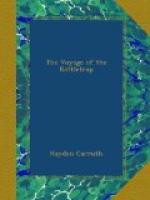“Ten cents,” answered the woman. “Didn’t them cows seem to take kindly to you?”
“Well, they didn’t exactly crowd around me and moo with delight,” replied Jack, as he handed over a dime with rather bad grace.
That evening a neighbor called on us as we sat about our camp-fire, and we told him the experience with the cows.
[Illustration: Milking the Heifer that Wore a Sleigh-Robe]
“Puts me in mind of the time a fellow had over at the Santee Agency a year or so ago,” said our visitor. “There’s a man there named Hawkins that’s got a tame buffalo cow. Of course you might as well try to milk an earthquake as a buffalo. Well, one day a man came along looking for work, and Hawkins hired him. Milking-time came, and Hawkins sent the man out to milk, but forgot to tell hint about the buffalo. The man was a little green, and it was sort of dark in the barn, and the first thing he tried to milk was the buffalo cow. She kicked the pail through the window, smashed the stall, and half broke the man’s leg the first three kicks. He hobbled to the house, and says to Hawkins: ’Old man, that there high-shouldered heifer of yourn out there has busted the barn and half killed me, and I reckon I’ll quit and go back East, where the cows don’t wear sleigh-robes and kick with four feet at once.’”
Bright and early the next morning we got off again. Nothing of importance happened that day. We were travelling through a comparatively old-settled part of the country, and the houses were numerous. A young Indian rode with us a few miles, but he was a very civilized sort of red man. He had been at work on a farm down near Yankton, and was on his way to the Ponca Reservation to visit his mother. As an Indian he rather disgusted Ollie.
“If I were a big six-foot Indian,” he said, after our passenger had gone, “I think I’d carry a tomahawk, and wear a feather or two at least. I don’t see what’s the advantage of being an Indian if you’re going to act just like a white man.”
We camped that night in a beautiful nook in a bluff near a little stream. The next day we reached Running Water. The ferry-boat was a little thing, with a small paddle-wheel on each side operated by two horses on tread-mills. A man stood at the stern with a long oar to steer it. The river was not so wide here as at Yankton, but the current was swifter, which no doubt gave the place its name. It looked very doubtful if we should ever get across in the queer craft, but after a long time we succeeded in doing so. It gave us a good opportunity to study the water of the river, which looked more like milk than water, owing to the fine clay dissolved in it. The ferry-man thought very highly of the water, and told us proudly that a glass of it would never settle and become clear.
“It’s the finest drinking-water in the world,” he said. “I never drink anything else. Take a bucket of it up home every evening to drink overnight. You don’t get any of this clear well-water down me.”




